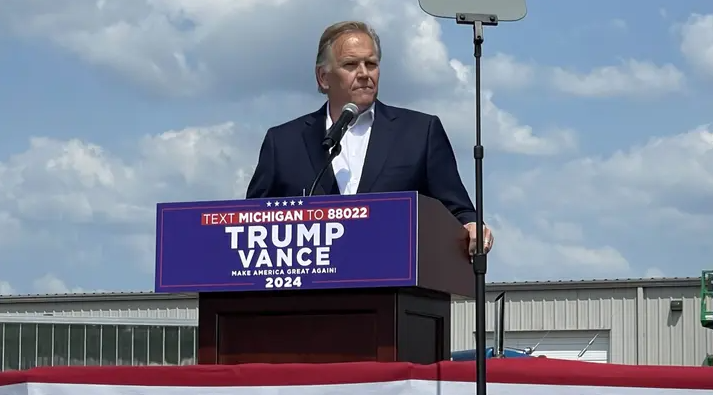President-elect Donald Trump’s deputy chief of staff, Dan Scavino, has confirmed that former Congressman Mike Rogers will not be considered for the position of FBI Director. Speculation surrounding Rogers had been fueled by his previous role as chairman of the House Permanent Select Committee on Intelligence, as well as his experience in law enforcement and national security. However, Scavino dismissed the rumors, stating that Trump “has never even given it a thought.”
The announcement comes as the Trump administration prepares to select a replacement for Christopher Wray, whose tenure as FBI Director has been the subject of criticism from Trump and his allies. The decision is seen as pivotal for the administration’s goals of reforming the FBI and addressing allegations of politicization within the bureau.
Why Rogers is Not Being Considered
Although Rogers was once seen as a logical candidate for FBI Director due to his background in intelligence and security, his candidacy has faced internal opposition within Trump’s circle since 2016. During Trump’s initial transition team, Rogers was removed from a key advisory role, reportedly due to disagreements with senior advisers over his approach to intelligence issues.
Rogers’ bipartisan reputation, while an asset in some circles, may have been a factor in Trump’s decision to move in a different direction. The president-elect has emphasized loyalty and alignment with his vision for federal agencies, suggesting that candidates with closer ties to his administration are being prioritized.
Who Could Replace Wray?
With Rogers out of the running, attention has shifted to other potential candidates for the position of FBI Director. Among those reportedly being considered are:
- Kash Patel: A former National Security Council official and senior adviser to the acting Director of National Intelligence, Patel is known for his loyalty to Trump and his involvement in investigations into FBI misconduct during the Russia probe.
- Jeffrey Jensen: A former U.S. Attorney for the Eastern District of Missouri and a former FBI agent, Jensen has a strong law enforcement background and has worked on cases involving high-profile federal investigations.
- Jason Chaffetz: A former Utah Congressman and chairman of the House Oversight and Government Reform Committee, Chaffetz is a staunch conservative who has been vocal about the need for reforms within the FBI.
- Andrew Bailey: Currently serving as Missouri Attorney General, Bailey is a constitutional conservative with a focus on law and order, aligning closely with Trump’s priorities.
The Stakes for the Next FBI Director
The selection of a new FBI Director will be a critical decision for the Trump administration as it seeks to restore public trust in the bureau and address allegations of partisanship and misuse of power. The next director will be tasked with navigating complex challenges, including countering domestic and international threats, managing high-profile investigations, and ensuring the agency’s independence while maintaining accountability.
Trump has made it clear that he envisions an FBI that aligns more closely with his administration’s law-and-order platform, and the next director is expected to implement significant changes to the bureau’s structure and culture.
Challenges Ahead
The confirmation process for the next FBI Director is expected to be highly contentious, with Democrats likely to scrutinize Trump’s nominee over issues of independence and adherence to the rule of law. Republicans, on the other hand, are expected to back a candidate who shares Trump’s vision of reforming the agency.
The new FBI Director will also inherit several pressing issues, including ongoing investigations into election interference, cybersecurity threats, and high-profile criminal cases. Balancing these responsibilities with the need to address internal reforms will require a leader with both experience and resilience.
What This Means for Trump’s Administration
The decision to bypass Rogers and focus on other candidates reflects the administration’s desire to install leadership that is fully aligned with its priorities. As Trump prepares to take office, his selection for FBI Director will set the tone for his approach to federal law enforcement and his broader efforts to reshape key government agencies.
The announcement underscores the importance of the role, not just for the Trump administration, but for the country as a whole, as the FBI continues to play a central role in safeguarding national security and upholding the rule of law.


